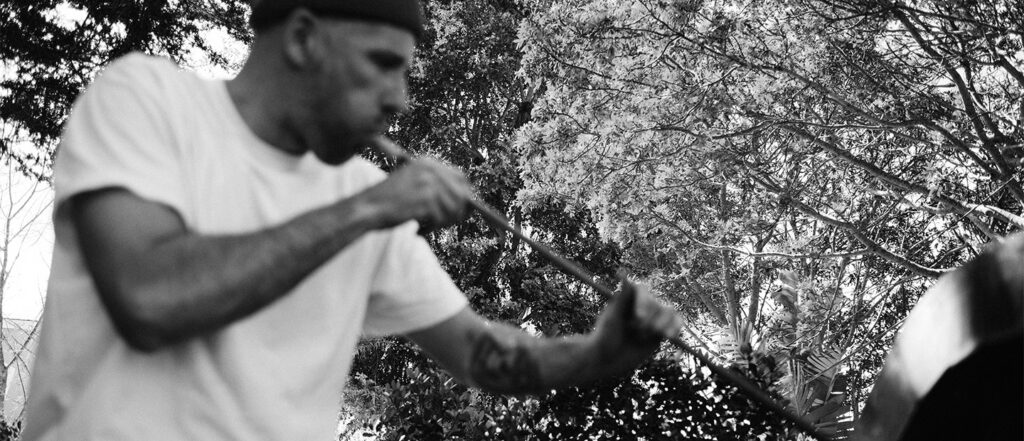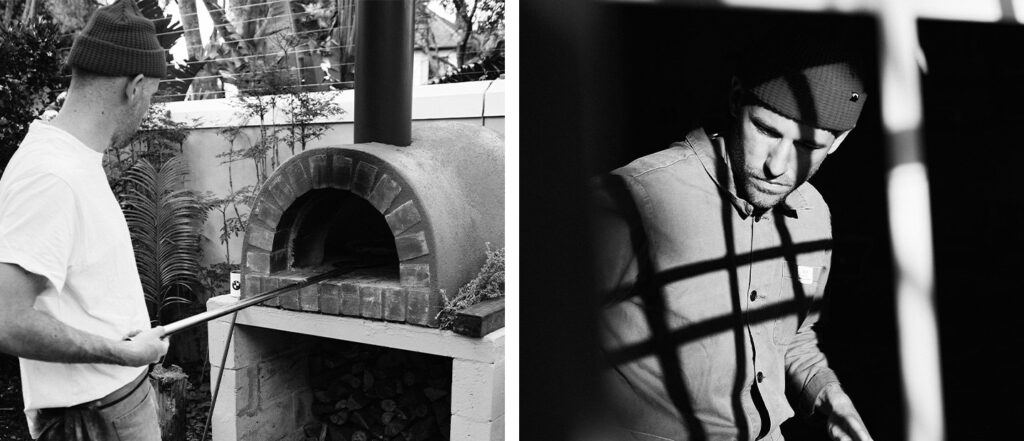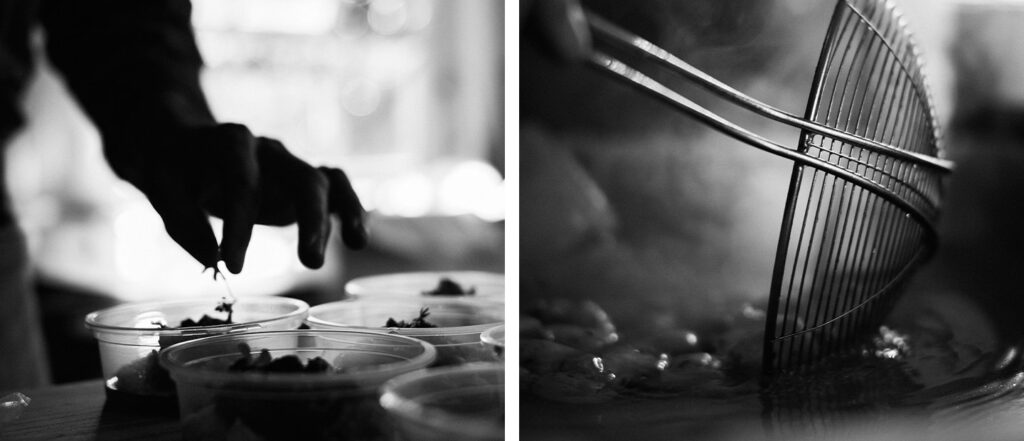Covid struck and lockdown set in at exactly the wrong moment for chef Wesley Randles. A string of plans and dreams were just about to come together. Everything was up in the air, and the plague rolled into town.
Wesley Randles speaks with the slow, measured cadence of someone who has seen some shit. He never says more than he needs to, and he always means what he says. When he tells you 2020 has sucked, he really means it.
Back in ‘The Time Before Covid’, Wesley had a plan. He told his partners at The Shortmarket Club that he was done. He was packing his knife roll and moving his family to St Francis Bay where he’d just paid a deposit on a house by the beach. Wes was looking to lead a quieter life where he could spend more time with his wife Juliet and son Jack.
Then the ‘ronahit and his world fell apart. With their change of direction firmly in motion the Randles family got rug-pulled by the unravelling financial situation in the hospitality world. Suddenly unable to afford their dream house, they had to put their plans on ice. As he recalls, “I remember getting the letter from the lawyers that said we weren’t getting our deposit back because we signed the offer. They were taking everything. That was a shit day.”
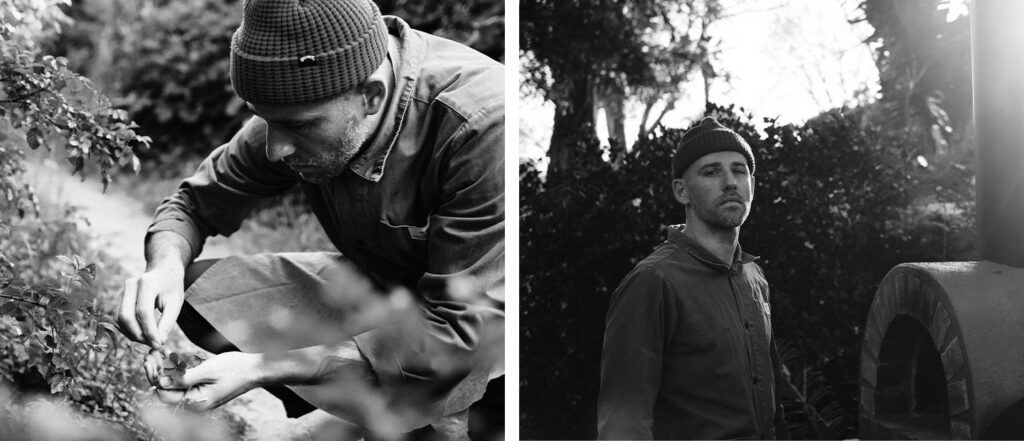
With their nest egg gone, the industry shut down, no home, no job and diminishing options, things looked bleak. The offer of a spare room at Juliet’s parents’ house was the only glimmer of hope. They moved in, sat down and considered their options.
History is important, particularly so in Wesley’s case. The Shortmarket Club and its edgy little neighbour The Commissary were only the most recent stepping-stones in the short but illustrious career of a chef who at just 33 is held in the highest regard by his peers.
There are enough restaurant industry accolades on his wall to impress any casual observer, but those are not what sets Wesley Randles apart. His status among his peers, his cool hand under pressure, and his rapid climb through the ranks of notable Cape Town chefs; those are the badges that matter.
“I started working in restaurants in Durban when I was 14. My parents were like ‘teenagers are lazy and need to work’ so I got dropped off on a Friday evening at a family friends’ restaurant,” offers Wes by way of filling in the gaps. “I was a busboy or sculler, whatever they needed.”
The team at the restaurant quickly accepted the teen as one of their own. His experience of the camaraderie and the ‘family’ there profoundly influenced the easy hand with kitchen brigades and restaurant crews for which he is so well known. It was his home away from home.
The idea of a career in the industry took hold and he started reading recipe books and watching BBC Food programmes. By the time he was 17, he was working five nights a week at the restaurant, heading straight to work after school for the night shift.
After matriculating, Wesley took himself off to Cape Town to study at Silwood cooking school. His final restaurant internship in second year was at La Colombe under Luke Dale-Roberts. The two ‘clicked’ and the third year internship was spent full-time at La Colombe with the offer of a permanent position when he graduated.
“At that stage it was already the best restaurant in the country, and in 2010 we were voted number 12 in the world, which was huge,” he remembers. “Then Luke left to open Test Kitchen and took me with him.”
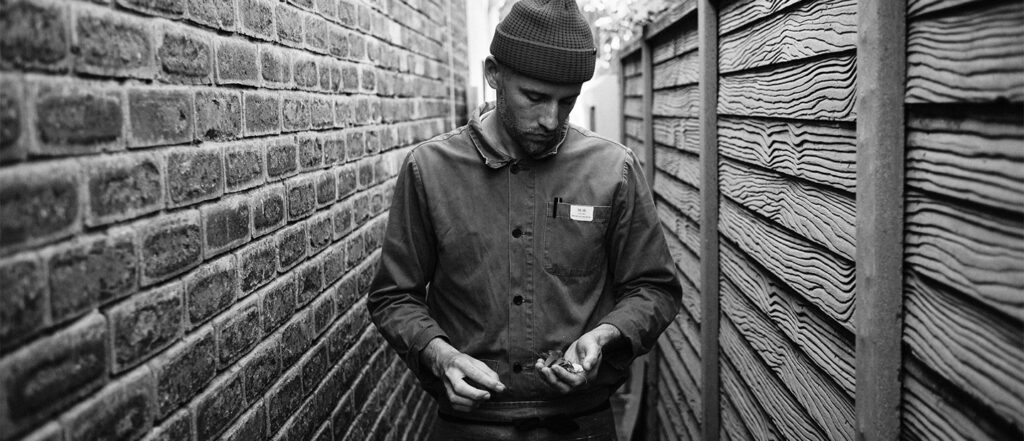
2010 marked the beginning of a golden age for Wesley. Test Kitchen opened in November and three months later he was the sous chef there. A year later it was voted number 2 in the country at the Eat Out Awards. Something Luke always pushed was that his sous chefs had to create. He would float an idea and expect his understudy to perfect it. For Wesley it was a great learning curve, but it didn’t come easy. It did, however, earn him his stripes and Luke’s trust. When Luke opened The Pot Luck Club, Wesley began a four-and-a-half year stint as head chef there.
After roughly four years of playing to packed houses and collecting a stash of gongs for his food, Wesley got a call from Brad Armitage. One of the brand mavens behind the creation of Vida e Café and Brewers & Union, Armitage was also involved in the inner-city hot-spot The House of Machines (THoM). The partners from THoM had taken over the lease on the building occupied by their bar as a foil to the continued existence of a sketchy nightclub upstairs. Part of the space was pegged for a little speakeasy-type cocktail bar called Outrage Of Modesty and other plans envisioned a cool fine diner in the old warehouse space next door.
A regular at THoM, Wesley lived nearby so he knew the potential of this part of the city. He pitched the space to Luke and The Shortmarket Club was born. They partnered up and a new adventure began with new realities to wrestle.
“Restaurants are a hard way to make money, especially in fine dining. A bar slinging food for drunk people is different. Turnover might be lower, but there’s more profit. I open a beer and hand it to you; there’s 200% profit. All I’ve done is open a bottle,” says Wesley.
Being the proprietor of a fine dining place is another story though. The time and effort, that goes into sourcing ingredients and preparing each dish is exceptional. Even though his team knew how to do everything, Wesley always felt he needed to be there, digging at it with them. It was full-on. Six or seven days a week, clock in at 8am and wrap at midnight. Pretty intense lifestyle.
While Shortmarket Club quietly collected star ratings and began appearing on bucket lists, big things were happening in Wes’s personal life. He married Juliet, a gifted pastry chef he’d met while studying at Silwood, and their son Jack was born soon after.
When the crew from THoM closed Outrage Of Modesty and the space became available, Wesley pitched a concept for a small-space, small-plate restaurant aimed at locals. Luke loved it, and The Commissary was born. It was an instant hit. But while it took off, cracks were starting to appear. The pressures of fatherhood and the crazy demands of the kitchen roster began to strain his business partnership.
“I was grinding at work and getting no sleep. Jack was a baby and I was only getting home after midnight. He would be up to feed at 2am and then again at 4am and so on. I never got to see him or Juliet. Something had to break, and it was me. It had been a long time coming to be honest, and one night it just ended for me. I realised I needed to stop this.”
Somewhere in all this jumble of Shortmarket shifts rolling into Commissary pick-ups and feeling like he was missing watching his son grow up, the idea of St Francis Bay arose. Wesley had spent childhood holidays in the town with a family friend who ended up moving there later in life. He took Juliet and Jack on a short break to visit his friend and something clicked. Wesley didn’t want to be the parent who just worked and never spent time with his kids. He wanted to share his passions with Jack; surf with him in the morning, maybe hit the skate park in the afternoon. St. Francis offered the chance to do just that.
They went searching, found a house they liked and put in an offer. Wesley informed his partners at Shortmarket that he was calling it quits and started planning their new life closer to nature, closer to the sea, as part of a community where they could enjoy being a family.
As Wesley puts it: “I don’t want to look back and regret how much time I spent in the kitchen. If I still want to do that when Jack is 17, or going to university or whatever, I can. If I still have the drive and passion, I can open a fine dining restaurant and have another go. But at least I won’t miss out on that time with him, hanging out, being a dad.”
So it seemed a gentle future of fatherhood, surfing and a little cooking here and there was just within reach. Then Covid blindsided them. Sitting in that spare room at her parent’s house, Wesley and Juliet looked at their options, turned over their few remaining pennies, and came up with a plan: “We were like; we need to do the only thing we know how to do and that’s cook. Let’s just cook”
The couple took the business idea they had been formulating for the St Francis move and retro-fitted it to their new reality. The chef-for-hire, catering and wedding concept with a heat-and-eat convenience option became Randles and Son. They would create great meals using amazing ingredients in a heat-and-eat format and deliver them.
“We cook stuff we would want on our dinner table with a nice bottle of wine. Generally that’s like a country Italian kind of style, using great ingredients and always fresh bread with a dip or spread to go with it.”
It was quite a shift for Wesley. Fine dining customers pay for a certain experience. Food must look and taste good, it must entertain and delight the senses. Meticulous plating and visual magic were part of the experience. With home delivery, everything was about flavour and convenience. The couple concentrated on using the best ingredients to deliver fabulous meals.
Juliet’s mom’s small kitchen had a single stove and an oven that didn’t work too well, but they made do. Word slowly filtered through the suburban grapevine (and Juliet’s mom’s book club) until they were delivering 90 meals a week. When the tenant in Juliet’s parents’ garden cottage moved out, they scraped the money together to put in a proper kitchen.
Ovens were expensive and the electricity in the house a bit spotty, so Wesley took himself off to Builder’s Warehouse for the gear to build a pizza oven outside. Randles and Son is ready to go with a new set of skills and road-tested processes. There’s even a second business that sprung from the wood-fired oven and Wesley’s newfound geekish fascination with dough. He’s started My Neighbour Marvin, frozen pizzas made the traditional Neapolitan way, and they’re selling as fast and he can turn them out.
It’s all been created in lockdown, under severe financial restraints, but there’s now a little light at the end of the tunnel. That dream of moving to a small town and being part of a community is within reach again.
“I want that vibe where you’re there, 5 o’clock, with all the groms surfing. The ballies are in the parking lot having a beer and talking kak, waiting for their kids. Everyone’s neighbours and it’s a rad lifestyle. I want to build a spot where you can come to this cool space and hang out and have a beer and eat good food. There’s amazing seafood being pulled out right in front of you there, we can take advantage of that. Make some lobster rolls, couple of oysters, cold beer and you’re good to go, you know?”
